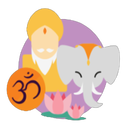CBSE Class 12 Sample Paper
If you practice CBSE class 12 sample paper on a regular basis, you will definitely get good marks in your class 12 board exams. Now, how to get the best model question papers for class 12 annual examinations? The simple answer is, you can get them from CBSE official website. But the problem is, there is only one sample paper on the CBSE website. So, the next question is where we can get similar question papers for practice.
myCBSEguide App is the only answer. Here, you will get the latest model question papers for class 12 board exams. We have sample question papers for almost all major subjects. You can download the CBSE class 12 sample paper in PDF format with a fully solved solution PDF.
List of CBSE class 12 Sample Papers 2024-25
- CBSE Sample Papers for class 12 Chemistry
- CBSE Sample Papers for class 12 Physics
- CBSE Sample Papers for class 12 Mathematics
- CBSE Sample Papers for class 12 Biology
- CBSE Sample Papers for class 12 Accountancy
- CBSE Sample Papers for class 12 Economics
- CBSE Sample Papers for class 12 Business Studies
- CBSE Sample Papers for class 12 Computer Science
- CBSE Sample Papers for class 12 Informatics Practices
- CBSE Sample Papers for class 12 English Core
- CBSE Sample Papers for class 12 English Elective NCERT
- CBSE Sample Papers for class 12 History
- CBSE Sample Papers for class 12 Political Science
- CBSE Sample Papers for class 12 Geography
- CBSE Sample Papers for class 12 Sociology
- CBSE Sample Papers for class 12 Engineering Graphics
- CBSE Sample Papers for class 12 Home Science
- CBSE Sample Papers for class 12 Physical Education
- CBSE Sample Papers for class 12 Multimedia and Webtech
- CBSE Sample Papers for class 12 English Elective CBSE
- CBSE Sample Papers for class 12 Entrepreneurship
- CBSE Sample Papers for class 12 Psychology
- CBSE Sample Papers for class 12 Philosophy
- CBSE Sample Papers for class 12 Biotechnology
- CBSE Sample Papers for class 12 Legal Studies
- CBSE Sample Papers for class 12 Hindi Core
- CBSE Sample Papers for class 12 Hindi Elective
- CBSE Sample Papers for class 12 Sanskrit Core
- CBSE Sample Papers for class 12 Sanskrit Elective
As we keep on updating our question bank, we advise you to visit the myCBSEguide app on a regular basis so that you can get the latest updates at the earliest. As discussed, CBSE sample paper class 12 solutions are also available on this application as PDF to download.
CBSE conducts board exams for class 12 students every year. CBSE class 12 annual board exams are very crucial for students. It is a deciding factor for their choice of the best career options. So, the students try their best to perform better in class 12 board exams. We know that CBSE takes exams for 70 or 80 marks only and the rest of 20 or 30 marks are given against practical exams or internal assessment.
Here is the table showing CBSE class XII board exam marks and practical or internal assessment marks.
|
Subject |
Theory |
Prac or IA |
|---|---|---|
|
English/Hindi |
80 |
20 |
|
History |
80 |
20 |
|
Political Science |
80 |
20 |
|
Geography |
70 |
30 |
|
Economics |
80 |
20 |
|
Music |
30 |
50+20 |
|
Psychology |
70 |
30 |
|
Sociology |
80 |
20 |
|
Physics |
70 |
30 |
|
Chemistry |
70 |
30 |
|
Mathematics |
80 |
20 |
|
Biology |
70 |
30 |
|
Accountancy |
80 |
20 |
|
Business Studies |
80 |
20 |
|
Home Science |
70 |
30 |
Design of the Question Paper
To ensure flexibility in the assessment at the Board examination, the detailed design of the paper is not included in the curriculum document. The details of the design of the Q.P shall be subsequently notified with the sample question paper. However, the Board examination shall test as per weightage allocated to each area or unit given in the respective subject.
Elective Areas
- Languages include Hindi, English and other 30 languages. The curricula in languages focus on listening, speaking, reading and writing skills for developing effective communicative proficiency. Learners use language to comprehend, acquire and communicate ideas.
- Humanities and Social Sciences- Geography, History, Economics, Home Science, Sociology, Fine Arts, Political Science, and related subjects promote the learning of history and culture, geographical environment, global institutions, constitutional values and norms, politics, economy, interpersonal and societal interactions, civic responsibilities and the interplay of all these. Learners appreciate and value every human’s right to feel respected and safe, and, in this regard, also understand their Fundamental Rights and Duties and behave responsibly. Learners learn to be tolerant and empathetic towards others through the study of these subjects.
- Sciences: Biology, Chemistry, Physics, Computer Science, and Informatics Practices help in making students perceptive about matter and energy, nature, the environment, technological breakthroughs in science. The focus is on knowledge and skills to develop a scientific attitude and to use and apply such knowledge for improving the quality of life. The Curriculum promotes the ability to engage with science-related issues, and with the ideas of science, as a reflective citizen by being able to explain phenomena scientifically, evaluate and design 4 scientific enquiries, and interpret data and evidence scientifically. Students understand the importance of applying scientific knowledge in the context of real-life situations and gain competencies that enable them to participate effectively and productively in life.
- Mathematics includes acquiring the concepts related to numbers, operations, computation, measurement, geometry, probability and statistics, the skill to calculate and organize and the ability to apply this knowledge and acquired skills in their daily life. It also includes an understanding of the principles of reasoning and problem-solving. Learners identify, integrate and apply numerical and spatial concepts and techniques. They have clarity of concepts and are able to connect them to the real world. Learners rationalize and reason about pre-defined arrangements, norms and relationships in order to comprehend, decode, validate and develop relevant patterns.
- Business and commerce-based electives- Business Studies, Accountancy, Entrepreneurship, Economics and related subjects help in gaining understanding about core business disciplines. They understand the concept like the exchange of items of value or products between persons or companies and the meaning/relevance/ significance of any such exchange of money for a product, service, or information.
- Visual; Performing and Creative Arts- Subjects like Dance, Drama, Music, Heritage Crafts, Fine Arts, Sculpture and related subjects aim to help learners cultivate interest and appreciation for arts and encourage them to enthusiastically participate in related activities, thus, promoting abilities such as imagination, creativity, value arts, and the cultural heritage.
- Skill Electives help in the development of professional competencies, which are analytical, applied and outcome-based. Undergoing skills training in schools can help students learn about a trade progressively to create a product and also to become problem solvers in real life. 5 At present many Skill electives are being offered by the Board in the fields of Hospitality and Tourism, emerging technology like Artificial Intelligence, Geospatial Technology, Finance, Business, and Retail & Insurance etc. Students can also choose subject from diverse areas such as Fashion Design, Agriculture, Banking, Mass-Media Healthcare and many more students.
- Health and Physical Education focuses on holistic development, both mental and physical, understanding the importance of physical fitness, health, well-being and the factors that contribute to them. The focus of this area is on helping learners develop a positive attitude and commitment to lifelong, healthy active living and the capacity to live satisfying, productive lives with the help of health management, indigenous sports, yoga, NCC, self-defense, fitness and lifestyle choices. These learning areas are to be integrated with each other in terms of knowledge, skills (life and livelihood), comprehension, values and attitudes. Learners should get opportunities to think laterally, critically, identify opportunities, challenge their potential and be open to challenges. Learners value and engage in practices that promote physical, cognitive, emotional and social development and wellbeing. This enables learners to connect different areas of knowledge, application and values with their own lives and the world around them. The holistic nature of human learning and knowledge should be brought forth throughout.
- General Studies: The purpose of orienting students to General Studies is to develop in them an appreciation for the holistic nature of knowledge. In contemporary times, familiarity with General Studies is indispensable because at the senior school stage there is an element of specialization due to which the students do not get exposed to some vital disciplines/areas of study that are not covered in their specialized field. The documents with details of Health and Physical Education and General Studies are available on www.cbseacademic.nic.in
We at myCBSEguide provide CBSE Class 12 sample papers, NCERT solutions, sample question papers, and chapter-wise quick revision notes on our myCBSEguide App for free download. You can also access the some on our student dashboard that offers board exam question papers and their solutions free of cost.

Test Generator
Create papers online. it's FREE.

myCBSEguide
Trusted by 1 Crore+ Students
 myCBSEguide
myCBSEguide



























